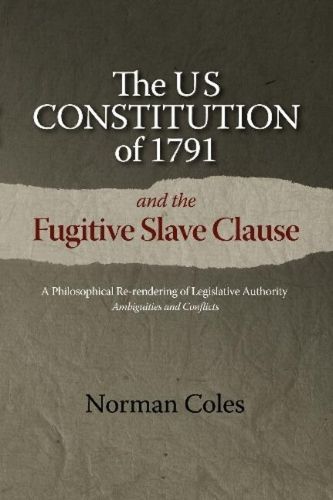The US Constitution of 1791 and the Fugitive Slave Clause: A Philosophical Re-rendering of Legislative Authority: Ambiguities and Conflicts
Norman Coles

The US Constitution of 1791 and the Fugitive Slave Clause: A Philosophical Re-rendering of Legislative Authority: Ambiguities and Conflicts
Norman Coles
The US Constitutions, both of 1788 and 1791, contain at Article IV (para 2, Section 3) a clause generally called The Fugitive Slave Clause. This Clause was held to make it legal to both recapture and return fugitive slaves to the states where they had lived or the owner, even if he or she resisted. The Clause was held to be constitutionally legal by lawyers and legal commentators. Even Lincoln as a lawyer thought the Clause was constitutionally legal, even though he thought slavery evil. Norman Coles presents arguments which show that the Clause has at least two (and possibly three) meanings. The Clause may not refer to slaves at all, when it is interpreted in accord with its actual phrasing rather than its intended meaning promoting the wishes of owners. Alvan Stewart, a renowned Abolitionist lawyer, argued that the Clause was inconsistent with that part of the 1791 US Constitution which is Amendment IV, reasoning premised on the definition of person, which applied to the two dated Constitutions; and with regard to the Fourth Amendment (1791) where slavery (unless a result of crime and jury trial) was illegal under US law. Stewarts arguments are about Constitutional principles, not the practical consequences of believing the Clause was law. Stewarts reasoning is penetrating; arguments relating to ambiguity and legal jargon are superseded by the logical consequence of the fact that if the Clause is about fugitive slaves, its legality rests on false assumptions. Herein lay the potential to avoid an historical tragedy. In the course of time legal and political champions, in conjunction with a growing number of US States, favoured laws which barred slave-hunting, but in the interim legal inadequacy resulted in the unnecessary continuation of slave-holding. This publication is a fundamental reconsideration of the intertwining of American History and American Constitutional Law.
This item is not currently in-stock. It can be ordered online and is expected to ship in approx 2 weeks
Our stock data is updated periodically, and availability may change throughout the day for in-demand items. Please call the relevant shop for the most current stock information. Prices are subject to change without notice.
Sign in or become a Readings Member to add this title to a wishlist.


